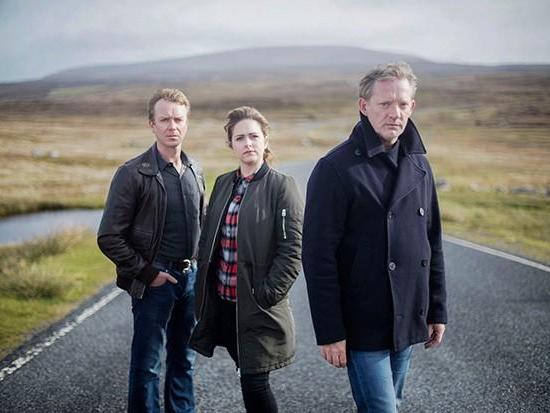Shetland review: Well-paced return with stunning scenery
The fifth series succeeds in giving its fans exactly what the best TV detective dramas usually do

Your support helps us to tell the story
From reproductive rights to climate change to Big Tech, The Independent is on the ground when the story is developing. Whether it's investigating the financials of Elon Musk's pro-Trump PAC or producing our latest documentary, 'The A Word', which shines a light on the American women fighting for reproductive rights, we know how important it is to parse out the facts from the messaging.
At such a critical moment in US history, we need reporters on the ground. Your donation allows us to keep sending journalists to speak to both sides of the story.
The Independent is trusted by Americans across the entire political spectrum. And unlike many other quality news outlets, we choose not to lock Americans out of our reporting and analysis with paywalls. We believe quality journalism should be available to everyone, paid for by those who can afford it.
Your support makes all the difference.People trafficking, prostitution, murder, manslaughter, kidnap, fraud… there hasn’t been a right lot to giggle about in the latest (fifth) series of Shetland (BBC1). I suppose slapstick isn’t what you’d expect from the BBC’s take on Scandi-noir, but still our heroic, stoic, solitary detective DI Jimmy Perez (Douglas Henshaw) manages to crack a gag, in the last minutes of the last episode. Trying to cheer up his old mate Duncan Hunter (Mark Bonnar), his life lately destroyed by a crooked accountant, Perez tells him: “Watching you live your life is like watching Scotland try to qualify for the world cup. Frustrating. Embarrassing. At times excruciating. But ultimately I live in hope that you’ll get there in the end”.
Watching Shetland, by comparison, is nothing like watching Scotland (or, less often, England) try to qualify for the World Cup. Shetland, contrast, succeeds in giving its fans exactly what the best TV detective drama series usually do - a well-paced script, plenty of well-crafted plotlines and tricksy clues, stunning scenery and, of course, a broody, complex, compromised central character at the core of it all.
But one who cares, as Perez does almost in defiance of his nature, and it is difficult to imagine anyone quite playing the role with the maximum understatement that Henshaw brings to the task. He rarely betrays emotion, even when he recovers the kidnap victim he has spent the whole series trekking after. Nor even when his only chance of romance, with disintegrates in his own hands – because she is the estranged wife of one of the central villains. Thus, through force of circumstances – and entirely naturally – he is forced to ask Alice Brooks (Catherine Walker) about her business activities and what she knows about the past and present, of her husband Chris (Derek Riddell). He, it turns out is the man who has been instrumental in the local people trafficking business. But when Perez confronts Alice about it she feels insulted and upset. So much so that, when her innocence is established, she rejects him, telling him that in a place such as Shetland, where “everyone’s connected”, “maybe you should be alone”. Not a tear in sight, but it rang true.
By contrast, the most powerful scene in the series comes when Olivia (Rakie Ayola) is told by Perez over the phone that her daughter Zezi (Titana Methuen) has been found and is safe – that is all tears, for Olivia and for the viewer too. Olivia is slumped in the bath, a hefty dose of sleeping pills taken, but the call wakes her and saves her from sliding towards eternal sleep. She, after all, has already lost her son, who came to Shetland to search for her, and had given up hope of ever recovering her other child. Even at the end, though, mother and daughter are not entirely reconciled – not least because Olivia felt she had to give up Zezi for adoption in Nigeria when she was very young. Ayola’s is a brilliant, powerful embodiment of maternal emotions.
In typical TV detective show fashion, we also had to have a subsidiary, diversionary multi-person murder cleared up before the final credits could roll: the Hayes. These are dodgy types with some links to those suspected of the people trafficking, and had been slaughtered in their home in what appeared to be either revenge (by Olivia), or as part of some related dispute in the kidnapping gangs. This time, though, it is unrelated. The Hayes were stabbed to death because they were getting in the way of their teenage son and his girlfriend, and so they had to die. The father, Prentice, was deliberately killed for being “an animal” who liked to watch people suffer. The mother, Carla, went by accident because she got in the way. Even given the sometimes wild parameters of crimes of passion this was probably stretching the elastic of dramatic credibility a bit too far. It wasn’t absurd, but it was just a bit unsatisfactory as a resolution.
The fate of the Hayes, though, was a rare flaw in an otherwise beautifully shot, carefully constructed and sharply directed series. I look forward to the return of DI Perez, and sincerely hope that he develops what seems a promising line in mordant wit. And that Scotland qualifies for Qatar 2022. It might cheer him up.
Join our commenting forum
Join thought-provoking conversations, follow other Independent readers and see their replies
Comments